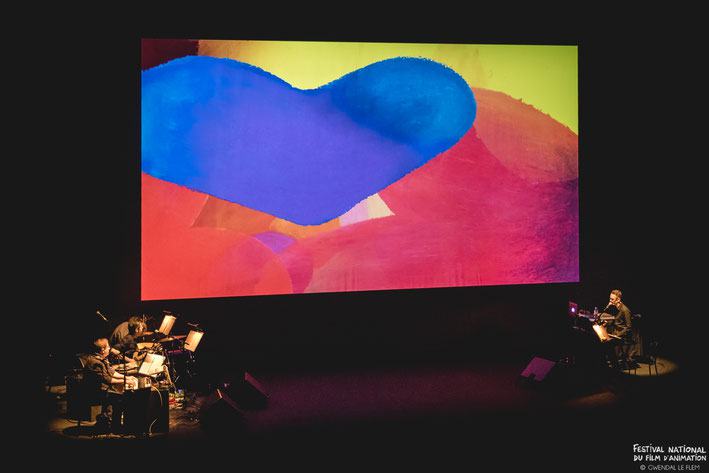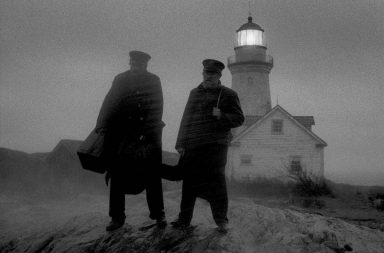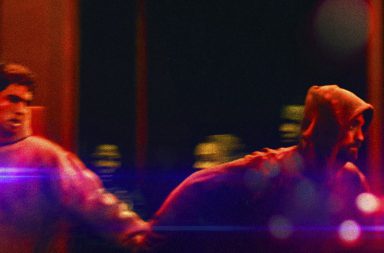Inspired by our partnership with the European Animation Awards, we celebrate all things animation for our November #AnimationMonth here at Score it Magazine! This wonderful award ceremony unites, celebrates and honours all the talent within the European Animation community. We talk you through the Emile nominees for the Best Soundtrack in a Feature Film Award and the Best Soundtrack in a TV/Broadcasting Production, so you are fully preped and ready for awards night.
Born in 1983, French musician and music arranger Pablo Pico also plays with several classical and jazz music bands, aside from the scores he composes for many short animated films. In 2015, he composed the soundtrack for the animated feature film Adama with the participation of acclaimed French hip hop artist Oxmo Puccino. The film won the Gan Foundation Aid for a Work in Progress Award at the Annecy International Animated Film Festival. Besides, Pico won several awards for his scores.
Julien Divisia is one of the founding members and guitarist of math rock band We Insist!, created in 1995 in Paris. For several years now he composes music for TV documentaries. Fresh Out of School is the first animated work he and fellow musician Frédéric “Freddo” Marchand have ever scored for.
For over 15 years, Yan Volsy has been working as a composer and/or sound editor for many feature and short live-action and animated films, documentaries and video games. He composed the music for 5 episodes of Fresh Out of School and works as the regular sound supervisor since season 2.
For four years now, Fresh Out of School gives, in three minutes, sight and sound to the texts written by some of the most celebrated French poets of the 20th century: Jacques Prévert, Robert Desnos, Guillaume Apollinaire and Paul Eluard. The episodes of the series, produced by Tant Mieux Prod and aired on France 3, are directed by young students from twenty animation schools, each of which has its own style and technique, whether it is traditional animation, stop motion, paper cut, 3D animation… The fifth season, which will put images and music on the poems of Claude Roy, will air in March 2018.

Julien Divisia, Pablo Pico, Freddo Marchand and Yan Volsy performing on stage the concert film adapted from Fresh out of School.
Score It Magazine: You come from very different backgrounds, some of you even experienced scoring for an animated project for the first time. How did you get involved in this project?
Julien Divisia: Delphine Maury, the founder of Tant Mieux prod and producer of the show, should take credit for it. She already knew me and Frédéric, because she heard a piece that I had composed for a documentary called Passagères, directed by Mara Canobbio, and she has been wanting to work with Yan and Pablo for a long time. She had a hunch that she had to gather all of us, and it turned out to be worth it, since we are currently doing our third season of Fresh Out of School together, which will be dedicated to French poet Claude Roy. During my childhood and my teenage years, I had classical music training but my tastes drawn me to rock music, and more particularly to a band called We Insist!. They’ve been making powerful and lively music for about twenty years now. They toured Europe and did hundreds of live shows, and they have just released their seventh album, Wax and Wane, on a Bordeaux-based label called Vicious Circle. As different as we can be with my colleagues from Fresh Out of School, we made sure we got our stories straight so we would be able to write some of the pieces together and play them in duets, or even in quartets. Our differences surprise each other, and it is even better when you know how to open up to it.
Each episode has a different director, and each director has a particular technique and a particular style. How did you work with them in the process of composing the score?
J. D.: We met the whole group, then we met each of them individually as they got out from a one-month residence in Fontevraud, in Western France, where they could complete their screenplays and finish off the first animatics. We listened to their expectations and compared it to our points of view. At this stage, Pablo and Yan were very useful since they knew the world of animation which Freddo and I were just starting to discover. We then shared the work quite simply, according to our musical or graphic affinities. I personally enjoy musical experiences that venture quite off the beaten track, but it’s just as good to make an effort and to try and compose with another musician’s or director’s universe.
Yan Volsy: Once the work is shared and accepted, the collaboration then between the composers and the directors is rather classic: we propose one or several models, then we make some changes…
The bound shared by music and poetry is very interesting, and Apollinaire’s poems, in particular, have a beautiful melancholic musicality. How did you manage to put Apollinaire’s poems in music while staying true to your own styles? Did you take any inspiration from the poems themselves?
J. D.: My own inspiration is brought to me by a triple alchemy. Before I even discover the poems, I take a look at the director’s graphic universe in the project presentation, or I watch his or her previous films. In doing so, I can quickly feel what we can do or not. Then, the individual meeting I mentioned earlier allows me to confirm or to refute this feeling and it helps us see how we can collaborate. Some of the directors – most of them are women – have very special expectations, some others are more open to suggestions. I find it more exciting when I am pushed beyond my limits: the collaboration turns out to be a real challenge. Finally, the poet’s words, and the musicality of the voice of the actor that reads them, work as a major influence. Without an emulsion, it would be discordant. Just like a song. Apollinaire is amazing in Carte postale (directed by Fabienne Wagenaar), where he transforms the terror created by bursts of gunfire into a summer night beauty. The music had to carry this tension but what Fabienne expected above all was human breath. Freddo and I opted for a clarinet quartet that amplified the tension until the accordion, in a majestic and almost epic register, which is quite the opposite of how this instrument is generally used and heard, puts its own breath on the fight. In Bestiaire ou le cortège d’Orphée (directed by Florent Grattery), which can be understood as a digression – the description of different animals – the words already had in themselves this incredible, very free music. Florent asked me to write a “parallel score that would sometimes tell a story of its own, and sometimes meet the poem”. An actual challenge. I had a piano and a horn on my side and I am very proud of the result Florent and I eventually reached. In both examples, it’s more of a collaboration to me than a work of command.
Y. V.: I think that what the actors who read the poems have to offer –their rhythm, their acting skills, their musicality– is very important. The music has to leave enough space for the text. Furthermore, we make our first propositions very early on, from an animatic or an almost animated storyboard, which is not often easily readable. In this case, it is sometimes much more inspiring to let the music be guided by the beautiful prosody of someone like Jacques Gamblin or Romane Bohringer.
Each of you scored several episodes, but you all play on each other’s compositions. How did you all collaborate together?
Y. V.: We recorded and mixed all tracks for seasons 2 and 3 during a six-day residence at the Alhambra studio, in Rochefort, Southwest of France. Everything is already written when we begin the residence, but this fosters a very creative and competitive spirit. The studio is very spacious, the microphones are plugged in and the instruments are ready to be played, we can quickly try out some last-minute ideas. It’s sort of a pop music band energy, which is very different from classic score recording sessions, where everything is meticulously anticipated.
J. D.: There’s only one of us who has no choice, because he plays almost every instrument: it’s Pablo. Yan likes to tease him saying he plays “everything badly”, but he’s actually very good. Freddo and Yan are specialized in keyboards. I, on the other hand, am specialized in guitars and in bass, the latter being often missing from films because its frequencies register sound pretty bad on modern devices such as computers, TVs or even smartphones. We know our instrumentarium, which sure can help and guide us through the writing process, but if we happen to have other needs, we don’t see this as a restraint. In this case, we seek help from other musicians.
Yan, besides writing and composing scores since season 2, you also play on your colleague’s compositions and you are now the series’ sound supervisor and sound editor. In other words, you are the link between the sound and musical universe and the image. What challenges did you have to face?
Y. V.: The main challenge is the time and concentration required by the supervision work: I have to answer to many emails, follow the organization and the workflow, supervise the schedule and the budget and, to a lesser extent, intervene in my colleagues’ artistic choices, while trying to remain creative for my own compositions. I can create a bound between the sound and musical creation with the same artistic and technical gesture, so it is worth it. We can also decide to replace the music with an acoustic creation, as we did on season 2 with the film Paris, adapted from the Robert Desnos poem.
Julien, Frédéric, this is the first time you’ve composed the score for an animated project. How did you tackle this work?
J. D.: With desire, freshness and humility. Nothing’s better than that when you start a new experience. Discovering the world of animation, which is much more open-minded than many other professional environments linked to music or image, was a genuine pleasure. Writing music for these little things, made by passionate, crazy people, was a genuine pleasure – how can you be that crazy to design, animate and edit all of this, in a very tenuous connection with time that requests patience, meticulousness or even slowness, and being at the same time effective and fast because of the short deadlines? If I like these images, I’m never tired to watch them over and over again, just like a child, and trying to give an answer to it with music seems to me the most beautiful of all jobs. Of course, there are moments when you want to tear your hair out, let’s be honest, but all of this opened up a whole new universe to me. Since then, I wrote music for another animation film about Charles Bukowski: Love, He Said, which will soon be broadcast on Arte. It is directed by Argentinian director Inés Sedan. I also wrote a score for a documentary about the Centre Pompidou, directed by Julien Donada for France Télévisions, as well as a short fiction film by the same director.
Frédéric Marchand: In another life, I made short films, and the connection between images and music always interested me. When I had the chance to compose for images, I was very excited! I happen to be also a lead singer in a band so, of course, I included this dimension in different films.
Do you have any further projects together?
J. D.: Yes! Our friendly and musical harmony brought us to write a concert film together, aptly named “Fresh Out of School.” We created it last spring, during the Bruz National Animation Film Festival. Since then, we’ve toured France playing this concert film many times, during professional meetings, or, of course, in front of an audience, children and adults. It is a musical journey through 16 films adapted from the poems of Jacques Prévert, Desnos and Apollinaire. We could even be playing it in China soon! The public’s reactions are really enthusiastic and we have a feeling that this project could accompany us for some time.
Interview conducted, transcribed and translated by Valentin Maniglia.
Edited by Marine Wong Kwok Chuen.



